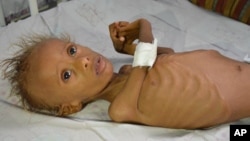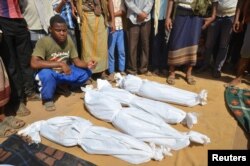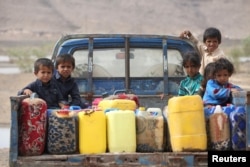The United Nations has appealed for $2.1 billion to provide life-saving assistance this year to 12 million people in desperate need of help in conflict-ridden Yemen.
This is the largest consolidated appeal for Yemen since the Saudi-led coalition began bombing the country two years ago in support of the government in its battle against Houthi rebels.
U.N. officials said the amount of money needed was a symptom of the humanitarian crisis facing the war-torn country. They said airstrikes have demolished bridges, key roads, entire neighborhoods and a port, leaving millions of people without electricity, safe water and food.
Stephen O'Brien, under-secretary-general for humanitarian affairs and emergency relief coordinator, said 18.8 million people, or two-thirds of Yemen's population, needed humanitarian assistance.
"Immense human suffering is unfolding in front of our eyes," O'Brien said. "Yemen is one of the most food-insecure countries in the world. A staggering 7.3 million people do not know where their next meal is coming from."
O'Brien noted that malnutrition was rising at an alarming rate, with nearly 3.3 million people — including 2.1 million children — being acutely malnourished.
O'Brien said he was shocked at the skeletal condition of many of the people he saw when he visited Yemen a few months ago.
"Children and youth were stunted and severely malnourished, barely holding on to their lives, and that was five months ago," he said. "Since then, the situation in Yemen has just simply gotten worse.
"It is particularly under-5s, mothers, lactating mothers, in particular, and women, the elderly, the chronically sick, who get particularly caught up with this," O'Brien told VOA. "In 2016, we were able to reach over 5.6 million people and this year, as is pretty clear from the numbers, we must reach even more."
‘Life and death decisions’
Humanitarian chief O'Brien warned that without immediate action "and despite the ongoing humanitarian efforts, famine is now a real possibility for 2017."
Jamie McGoldrick, the U.N.'s humanitarian coordinator in Yemen since December 2015, has watched this situation unfold and says many Yemenis are forced to make difficult choices just to survive.
"Fishermen cannot fish, farmers cannot farm, civil servants do not get paid," McGoldrick told VOA. "What you have now is a situation of a 23-month conflict, which has slowed down the ability of people to have a productive capacity" and to cope with this crisis.
"What you have is people having to make life and death decisions," he said. "Do you feed your child or your children or do you pay for medical treatment for the sick child?
"And, that is a daily call for many families," he said.
Yemen traditionally has been one of the five poorest countries in the world. McGoldrick said the two-year-long civil war has increased the fragility of communities.
He said people were so poor they were unable to afford travel to feeding centers or to hospitals where they could find help.
"There are many people dying silent deaths," he said, noting their deaths go "unrecorded and unrecognized because 50 percent of health facilities do not function" and people do not have the money to send their children to these facilities.
Humanitarian coordinator McGoldrick said that around 7,500 people have been killed and 40,000 injured since the war began; but, he added, these "officially arrived numbers" cannot be verified because people "die at home and are buried before they are ever recorded."






